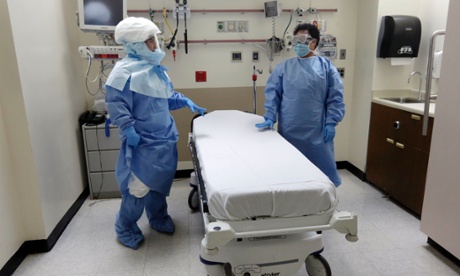Preliminary test confirms virus in Craig Spencer, a physician with Doctors Without Borders who had been working in west Africa

A physician who recently returned to New York from Ebola-ravaged west Africa has tested positive for the disease, officials announced.
Craig Spencer, 33, a doctor who lives in the Harlem neighbourhood of Manhattan, was taken to hospital in New York City on Thursday after displaying symptoms consistent with those caused by Ebola.
A preliminary test confirmed that Spencer has the virus.
Health officials had already said they were tracing the doctor’s contacts, which the New York City mayor, Bill de Blasio, said were not numerous.
“It is our understanding very few people were in direct contact with him,” de Blasio told a news conference before the diagnosis was confirmed. “Every protocol has been followed. We’re hoping for a good outcome for this individual,” he said.
City health officials said Spencer worked in one of the three west African countries affected by Ebola, which has killed more than 4,500 people since the current outbreak began. They said he returned to the US within the last 21 days, which is the maximum incubation period for the virus. It is believed he had been working in Guinea.
The physician was transported by a team wearing protective gear to Bellevue hospital with a fever and “gastrointestinal symptoms” on Thursday. Though the city’s statement did not specify, severe diarrhoea is a common Ebola symptom.
“A person in New York City, who recently worked with Doctors Without Borders in one of the Ebola-affected countries in west Africa, notified our office this morning to report having developed a fever,” Doctors Without Borders said in a statement.
The aid organisation, known internationally as Médecins Sans Frontières, said Spencer reported his fever immediately to the agency, in accordance with its guidelines for returning field workers. It was unclear whether the doctor had been quarantining himself.
Spencer’s public Facebook page, which has since been taken down, showed a photo of him dated 18 September wearing protective gear announcing he was heading to Guinea with Doctors without Borders. It showed him checking into a location in Brussels on 16 October.
His LinkedIn profile identified him as a fellow of international emergency medicine at Columbia University-New York Presbyterian hospital.
New York Presbyterian hospital released a statement in which it did not identify Spencer by name but called the patient “a dedicated humanitarian on the staff of NewYork-Presbyterian/Columbia University medical centre who went to an area of medical crisis to help a desperately underserved population”.
It said he has not returned to work at the hospital or seen any patients since returning from west Africa.
Leaders have attempted to reassure New Yorkers that the city and state are safe. City health officials repeated that Ebola is difficult to contract, since people must come into direct contact with body fluids of an infected and symptomatic person.
Many fears about the disease have swirled around New York’s status as a transport hub. Airports in the metropolitan area process the majority of passengers arriving from west Africa everyday, and John F Kennedy international airport and Newark, New Jersey’s airport, are now among the only airports in the US accepting such passengers. Starting on Monday, passengers from the worst affected countries – Guinea, Sierra Leone and Liberia – will be monitored for 21 days after arriving in the US.
As part of the governor’s Ebola preparedness plan, two ambulances are being regularly stationed at JFK and Newark airports, the city’s transit authority was provided with protective gear and training, and unannounced drills are being conducted at airports, college campuses and in subways. The governor designated eight hospitals in the state to handle Ebola patients.
To abate healthcare workers’ fears about the disease, New York City held an Ebola educational session on Tuesday.
